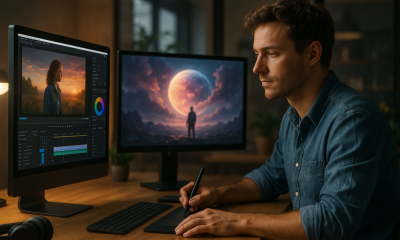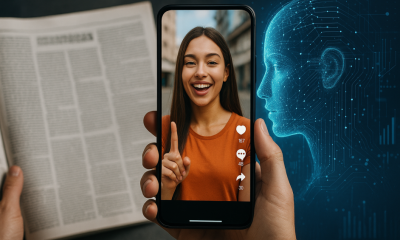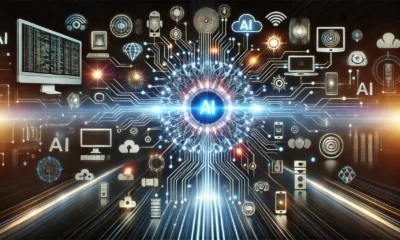Thought Leaders
Opinion: AI Won’t Replace Creatives. But Here’s What It CAN Do

For decades, we’ve told ourselves a comforting story about creativity: that it springs from some mysterious well within us, that it requires suffering, struggle, and late nights staring at blank pages, and that the magic happens in those moments when inspiration strikes like lightning.
But what happens to creativity when the blank page that once forced us to dig deep into our minds now comes pre-filled with algorithmic suggestions?
83% of creative professionals now use generative AI in their daily work. Companies that embraced these tools early report 72% of their teams hitting high productivity marks, compared to 55% for those still testing the waters. McKinsey’s economists have calculated the broader economic impact: $4.4 trillion in potential productivity gains across industries.
The question isn’t whether this is good or bad. The question is: Are we witnessing evolution, extinction, or human creativity?
Is AI that big of a threat to creativity?
Let’s look at the backlash against “The Brutalist”. Audiences didn’t reject the film for technical incompetence but for emotional hollowness. The uncanny valley isn’t just visual – it’s emotional. We can sense when something is performed rather than felt.
This aligns with broader resistance: nearly half of consumers refuse to watch films starring AI-generated actors, and three-quarters believe technology will never capture the essence of human creativity. Despite technological sophistication, we instinctively recognize the difference between pattern recognition and genuine insight.
This is where AI’s creative gap lies – it lacks the fundamental ingredient of meaningful creation: lived experience. It can analyze the structure of heartbreak without ever having its heart broken. It can map the patterns of triumph without ever struggling against impossible odds. While AI-generated content may be grammatically flawless and structurally sound, it lacks the emotional archaeology that comes from being human – the scars, the joy, the inexplicable moments that give weight to our words.
Creative decline
AI systems trained on existing datasets produce variations on familiar themes. They excel at recombining what already exists but struggle with revolutionary leaps that define great art. The real fear isn’t that AI will replace human creativity; over-reliance on AI will atrophy our creative muscles. When every story feels algorithmically optimized, we risk cultural flatlining.
Training your replacement
For the past decade, creative professionals have unknowingly been training their replacements. Every time we feed AI our writing samples to “learn our voice” and let algorithms analyze our design choices, we teach machines to predict us so well that we become redundant. The assistant becomes the decision-maker, and the human gets reduced to a curator.
Losing your instinct
Creative professionals need AI literacy not to enhance their vision but to avoid having it flatten their vision. The graphic designer who once trusted aesthetic intuition now depends on AI-generated color palettes. The writer who once wrestled with difficult passages now asks AI to smooth them out. Each AI interaction moves us further from our original instincts.
How to smoothly integrate AI into creative work and leave room for human talent?
Suppose we want to avoid becoming creatively obsolete in a world that promises efficiency but threatens authentic expression. In that case, we’ll need to treat human creativity as sacred territory – not outdated but irreplaceable, not inefficient but essential.
Guard your creative friction.
The struggle of creation – the false starts, the dead ends, the breakthrough moments – aren’t bugs to be fixed. They’re features of human creativity. Let AI handle the grunt work, but don’t let it steal the satisfying difficulty of original thought.
At DramaShorts, AI generates plot twists and analyzes story databases, but human writers still wrestle with character motivations and emotional truth. The machine suggests that humans decide what resonates. When you feel urged to ask AI for core creative ideas, pause. Ask yourself: Is this where my creativity lives?
Become fluent in AI’s blind spots.
Understanding what AI can’t do is more valuable than mastering what it can. AI aggregates existing patterns but struggles with genuine novelty. It can’t feel the weight of personal experience or handle the complex contradictions that fuel great creative work. Map these territories carefully – they’re where your human advantage lies.
Design resistance into your process.
Create deliberate friction in your workflow. Write first drafts by hand. Sketch concepts before opening design software. Have conversations before consulting chatbots. These seemingly inefficient practices aren’t nostalgia – they’re cognitive resistance training that keeps your creative muscles strong.
Treat AI as a research assistant, not a creative partner.
Let AI gather information, organize data, and handle repetitive tasks. When it comes to the choices that define your creative voice, keep those decisions human. DramaShorts uses AI to break down films for distribution in hours instead of weeks, but human editors still choose which emotional beats to emphasize and which cultural contexts to preserve.
Protect your creative imperfection.
AI excels at prediction and optimization, yet breakthrough creativity often arises from mistakes, misunderstandings, and unexpected connections. Make room for serendipity in your process – some of the best ideas come from detours AI would never recommend.
So, where does human talent end and AI take over?
AI won’t replace human creativity. But it might convince us that efficiency matters more than authenticity. And that would be the real loss.
While machines can generate content, only humans can choose what’s worth creating. Only we can bring emotional intelligence to the collaboration. And only we can decide that, in an age of algorithmic assistance, the distinctly human elements – authentic storytelling, genuine perspective, meaningful choice – are still what separate good work from great work.
In a world increasingly shaped by algorithms, thinking for yourself may be the most radical act.










